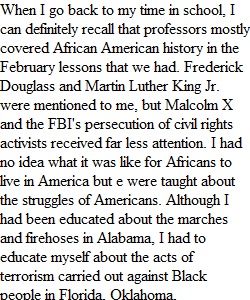


Q So, I am still in the process of checking out our first assignment, which I will be giving you all feedback on very soon. I wanted to just remind us that we will be coming back to the topic of our teachers & what they taught us at some later point in the semester, but to direct our second assignment toward the new material I've posted for this week. As a reminder, these assignments are worth 50 points each, & again, your responses here will only be shared with your instructor, not the rest of the class. You are to write roughly 500 words (or 1 single-spaced 12pt font page, though you can format however you'd like; single or double-spaced) exploring the following topics: • Prior to this class and this week's content, had you spent any time in a school setting exploring African history & culture? Share any relevant experiences here, whether it's something that was talked about, or something that nobody ever talked about in your school experience. • For each of this week's 3 videos, highlight which was the most important piece (or idea or quote) from your perspective, and why it is important. Important Details: You can choose to write more on one of the parts or the other, but should address both your own educational experiences and the videos for this week. Email me if you have any questions about this or want to discuss it at all. I look forward to reading your responses! PreviousNext
View Related Questions